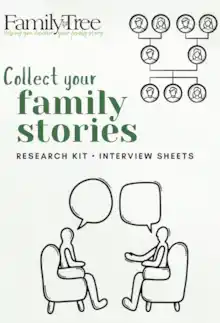06 September 2013
|
In the October issue of Family Tree, Emily Manktelow (lecturer in British Imperial History at the University of Kent) explor
In the October issue of Family Tree, Emily Manktelow (lecturer in British Imperial History at the University of Kent) explores the lives of our colonial ancestors in Australia, particularly the role of the British women. But of course they weren't the first settlers on the continent, and here Emily briefly outlines Aboriginal family history - both their experiences and tips on how you can research your possible Aboriginal connections too...
Family is a crucial part of Australian Aboriginal culture, which is strongly connected to the kinship network, which extends far beyond nuclear family structures. But when it comes to looking at Aborigine families, the colonial context can make for disturbing reading.
‘In this Colony, local circumstances have occasioned the total destruction of the Blacks within its limits... The un-matrimonial state of the thousands of male prisoners scattered throughout the country amidst females, though of another colour, leads them by force, fraud, or bribery to withdraw the Aboriginal women from their own proper mates, and disease, and death are the usual consequences of such proceedings. The Official return from one district gives only two women to twenty eight men, two boys and no girls!’
So wrote Lancelot Threlkeld, a Congregational minister and missionary in Australia in the years 1824 until his death in 1859. A strong proponent of Aboriginal rights, he placed the blame for this squarely on the shoulders of European emigration:
‘[The] cause of decrease amongst the tribes may be traced to the swelling tide of Emigration which has universally swallowed up the petty strains of Barbarism and the Aborigines have generally been either driven back to the forests, destroyed by force of arms or have become amalgamated with the overpowering people who thus: "Multiply, Replenish and Subdue the Earth."’
In this month’s issue of Family Tree I have been exploring the history of emigration to Australia, and highlighting sources available for tracing your emigrant ancestors, and fleshing out their story. But if your family has a 19th-century Australian connection, there is certainly a possibility that some of your ancestors may well be Aboriginal. Early settlers to Australia had frequent sexual relationships with the local women – often under conditions of force and coercion.
‘I have heard at night, the shrieks of girls, about 8 or 9 years of age, taken by force by the vile men of Newcastle. One man came to me with his head broken by the butt end of a musket because he would not give up his wife. There are now two government men that are every night annoying the Blacks by taking their little girls...’.
This can of course be difficult to confront as a family historian, but should not put you off finding out more about your ancestors.
Many Australian libraries and archives are now making efforts to make Aboriginal history more accessible to the general public – and the ‘good’ news is that the colonial state kept significant records about aborigines in the course of their projects to move, remove and ‘assimilate’ them. These make for uncomfortable reading – particularly when dealing with things like the Stolen Generation of children forcibly removed from their families and housed in residential schools where they often suffered physical and emotional abuse. Nonetheless, their history is an important part of the colonial and postcolonial history of Australia.
- The New South Wales State Library has an excellent guide to starting your indigenous family history research: http://guides.sl.nsw.gov.au/aboriginal-australians. Many of these records are available online for those unable to view them in person. See also the State Records Office of Western Australia guide: http://www.sro.wa.gov.au/archive-collection/collection/aboriginal-records/aboriginal-family-history
- The New South Wales Office of Communities: Aboriginal Affairs also has a Family Records Unit http://www.aboriginalaffairs.nsw.gov.au/about/family-records-unit/ which can help with enquiries and holds some relevant collections.
- It’s important to remember that for some of these records, special permission is required from the relevant Aboriginal communities. This is very much an emerging aspect of Australian family history, and a highly sensitive one. Don’t be put off though – this is an important part of your heritage as much as anyone in your family tree.
- Watch! Rabbit-Proof Fence (2002) which is an excellent cinematic depiction of colonial Aboriginal culture, and the history of the Stolen Generations in Australia.
- Read! English Passengers, a 2,000 novel by Matthew Kneale, dealing with the early colonial history of Australia. The novel won the Whitbread Award in 2000.
- Read! For a more historical account, see Henry Reynolds, This Whispering in Our Hearts (Allen and Unwin, 1998).
Read the full story of your British ancestors in Australia in the October issue of Family Tree, out now in WH Smiths, leading supermarkets and all good newsagents, or you can download our latest issue as a digital edition right now – visit www.pocketmags.com, the App Store, Google Play or Amazon Appstore. Single issues, back issues and subscriptions are available for PC, Mac, eReaders, smartphones and tablets. A free sample is also available for all devices.








